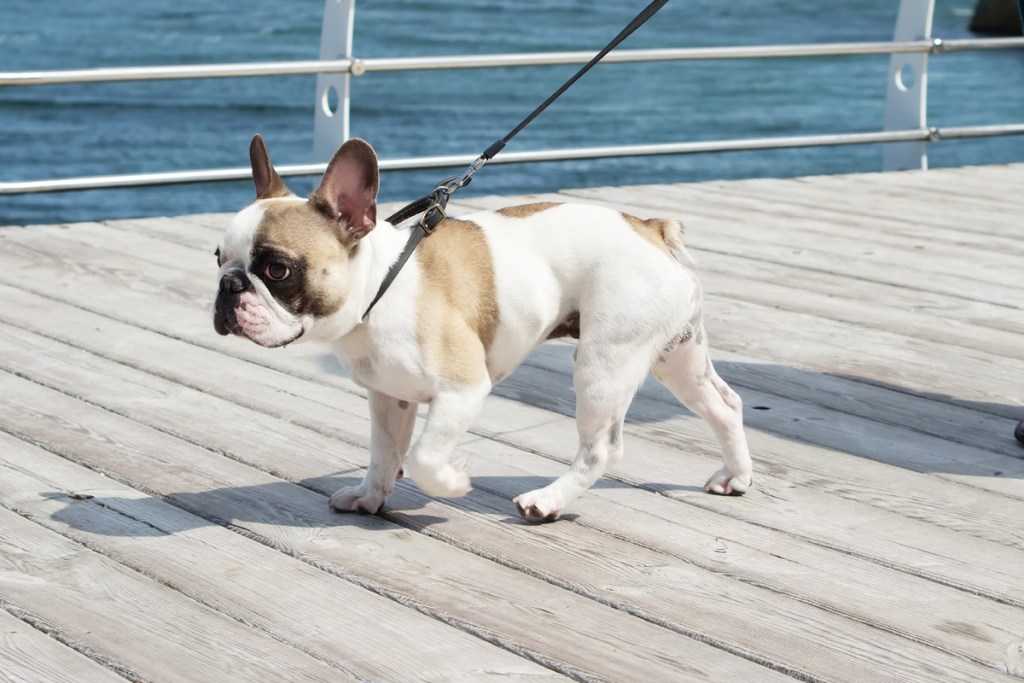So, your French bulldog sits by the table at mealtimes and looks at you with those pleading eyes. You can’t resist and think, what harm can one small piece of food do? A great deal, as it turns out. According to the Association for Pet Obesity Prevention (APOP), an estimated 56% of dogs in the U.S. are overweight or obese. Some dogs, including Frenchies, are more prone to obesity than others. Being overweight can lead to significant health issues in pets such as diabetes, pancreatitis, hyperlipidemia (high fat levels in the blood), joint disease, skin disease, and even a shorter life span, according to researchers at Cummings Veterinary Medical Center, Tufts University.
Why Frenchies are prone to obesity
Frenchies love to eat. It’s easy for them to gain weight and hard to get back in shape. They are also so darned cute and tend to be pampered by their owners — including being fed too many treats. Additionally, because French bulldogs are brachycephalic — they have short noses and flat faces — pet parents are cautioned against physically exerting their dogs in hot and humid weather to avoid breathing difficulties. Unfortunately, this is often interpreted to mean little or no exercise. So, it’s a combination of breed type, overfeeding, and a lack of exercise that leads to Frenchies being overweight.

Here are some telltale signs that your Frenchie needs to lose weight
- You can’t feel his ribs.
- You can’t tell the difference between his waist and abdomen.
- He has lost interest in physical activity.
- He tires quickly.
- He breathes heavily when just lying around.
The best way to confirm that your dog needs to lose weight is by taking him to see a veterinarian. Interestingly, experts at APOP say that many veterinarians hesitate to tell pet owners that their pets are obese. Weight issues are tricky, according to APOP, because they are “loaded with perceived judgment, strong emotions, and social stigmas.” However, as a concerned pet owner, you need to educate yourself about what is a healthy weight for your pet. Veterinary specialists say that weight is one of the most influential factors of longevity, quality of life, and disease prevention.
How to keep your French bulldog healthy
Count the calories
Don’t ask your vet how much food you should be feeding your dog; instead, ask how many calories you should be feeding, say APOP experts. That way, regardless of the type, brand, or formulation of food, you can determine how much to feed. Find out how many cups or cans of your pet food equal the correct number of calories and feed only that amount. Don’t forget to include any treats in your daily caloric counts. Depending on your dog’s current weight, your veterinarian may prescribe a special diet food. To keep your Frenchie at a healthy weight, you have to stick to this diet and never feed him people food. Everyone in the house must agree to the feeding plan, and nobody should be feeding snacks between meals, no matter how much your Frenchie begs. The begging will eventually stop when there’s no reward at the end.
Provide enough exercise
According to the French Bulldog Club of America, this breed’s fun and inquisitive nature makes them open to trying lots of activities. Well-bred French bulldogs participate in conformation dog shows, agility, obedience, and coursing. Many Frenchies also enjoy early morning or late evening hikes with their families when temperatures aren’t too hot. At the very least, American Kennel Club experts say that French bulldogs need one short walk and a few play sessions every day to keep them in shape. The best types of activities are based on your dog’s breed, age, gender, and current physical abilities. Your veterinarian can advise you on the best and safest exercise routine for your Frenchie.

Create a weight-loss program
Losing weight isn’t easy or fast for pets, according to APOP veterinary experts. You don’t want to put your Frenchie on a crash diet as that can lead to serious medical conditions. Patience and veterinary advice are essential when helping your pet shed pounds. Typically, dogs have a three- to six-month weight-loss plan that will gradually decrease the amount you’re feeding over a one- to three-month period. Your veterinarian can provide tips on how to help with cravings and begging as your dog works through the program.
If you think your Frenchie is overweight, now is the right time to do something about it. By speaking with your veterinarian and sticking to a weight-loss plan, you will soon have your best friend on the way to getting back into shape. Keeping your bulldog at a healthy weight means he’ll live a longer, happier life.



